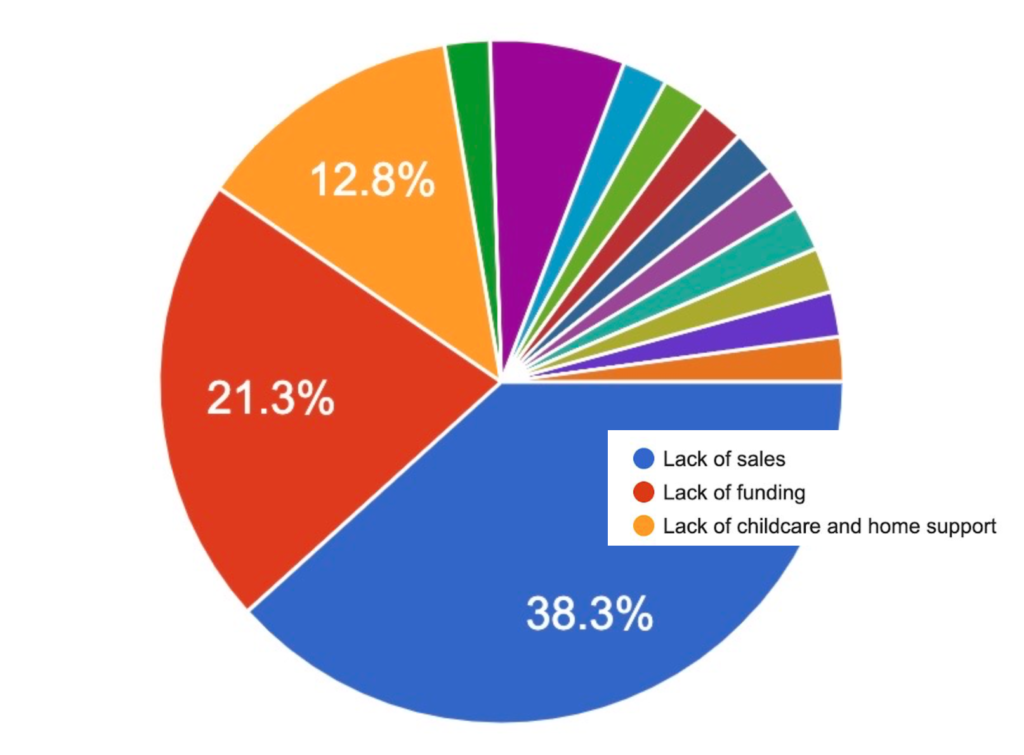
An Open Letter to General Counsel for Diversity + Inclusion – by Dana Denis-Smith and other signatories.
‘The coronavirus crisis is putting an unprecedented strain on almost all businesses as they contend with huge disruption, a remote workforce and a drop in demand for products and services on unprecedented scale. We have already heard that for small businesses the impact is particularly acute and whilst in most countries there is some government help available, many of these businesses do not qualify for it.
A snap poll of female founders running legal services businesses carried out since the lockdown started shows that in the space of only a few weeks, 39% have seen sales drop considerably and for 21% funding is now even harder to come by. With the third most commonly reported pressure being the added strain of childcare (13%) falling disproportionately on women, the perfect storm is here.
There is a real danger that coming out of the crisis, start-up ‘New Law’ businesses like these just won’t survive. In tough times, with budget cuts and extra scrutiny on spend, commitments to Diversity and Inclusion are all too easily forgotten and smaller, more innovative suppliers can be swept aside. There is a temptation for in-house counsel to turn to traditional suppliers that are perceived as less risky despite being shown to be less cost effective in the long run.
For those of you looking at your supplier relationships, we ask that you think about the long term. What will the market look like at the other side of this crisis?
Our concern is that female entrepreneurs who were already facing poor odds due to the structural inequalities prevalent amongst the investment community (fewer than 1% of all female founder teams received investment between 2015-2019, or just 65 businesses in the legal sector) and lower access to corporate spend (less than 5% of corporate spend is with women-owned businesses), will struggle to survive and thrive. Unlike larger firms, most do not have the ability to access capital arrangements with banks that would help to see them through if their sales funnel dries up and they do not have investor backing to champion them or co-finance any support.
Unless collective action is taken, we will be left with a less diverse, less vibrant market and that will be to the detriment of everyone working in the legal profession. The opening-up of the market to a range of alternative providers over the past 10 years has been hard won and reversing this progress would be damaging.
This is a crisis that is taking its toll on all of us and we must all play our part in minimising its impact. On behalf of all women who have together contributed to an emerging ecosystem of alternative legal services companies, we ask that when reviewing budgets and making procurement decisions in the coming weeks and months, you consider the long-term benefits of maintaining greater competition, innovation and supplier diversity in the sector.
Essential actions for the GC community to take today:
1. Where you can, provide certainty for suppliers
2. Where you seek new solutions, make sure you reach out to women- owned businesses not only to your panel
law firms
3. Keep lines of communication open and operate as close as possible to business as usual
4. Also think how you can encourage your law firm partners to do the same to safeguard the innovation we have seen emerging over the past decade.’
Signatories to this letter:
- Dana Denis-Smith, Obelisk Support
- Kerry Jack, Black Letter Communications
- Samantha Woodham, The Divorce Surgery
- Maaike Roet, House of Lawyers
- Mary Bonsor, F-lex
- Rachel Amos, Senate
- Catherine Krow, Digitory Legal
- Vanessa Challess, Tiger Law
- Chrissie Lightfoot, Entrepreneur Lawyer
- Jo Rogers, Navistar Legal
- Karin McKercher, Twenty2 Group
- Pip Wilson, Amicable
- Emma Reid, Ergo Law
- Silvia Hodges Silverstein, Buying Legal Council
- Vandana Dhamija, Legal Operations Consulting
- Susan Cooper, Accutrainee
- Dale Miller
- Mandy Aulak, Talem Law
- Victoria Moffatt, Lex Rex Communications
- Lori Gonzalez, Rayna Corp
- Janet Taylor Hall, Cognia Law
- Helen Burness, Saltmarsh
- Christina Blomkvist, Green Counsel
- Sara Hutton, Consultsh
- Denise Nurse and Janvi Patel, Halebury
- Helen Goldberg, Legal Edge
- Kaisa Kromhof, Contract Mill
—
Survey Data and Written Responses – Covid-19 Snap Poll of Female Founders in Legal/LegalTech – London, April 2020
Background
Just over 50% of people going into the legal profession in the UK are women and 60% of attorneys in the US are women, so there should be no shortage of women with relevant ideas and experience – why doesn’t this translate into representation in the ‘NewLaw’ industry (broadly used to cover tech enabled but also pure legal tech companies)?
As a founder myself, and a campaigner for women in law, I first initiated research into this cohort as I was not aware any had been conducted to establish the size of the female founder community in this sector.
Initial findings
I identified (trawling through Crunchbase for a 10 year period) circa 3,500 New Law businesses worldwide (that includes general suppliers to the legal sector and legal tech), of which 265 had at least one woman founder and 67 had a sole woman founder. We were particularly looking to find how many female founders raised more than USD250k to date.
We analysed the companies on Crunchbase and found as follows:
Top 10 Biggest fundraisers in legal to date – total raised to date by these was USD1.8bn 1999-2019 – none of them had a sole woman female founder; 18 men and 2 women (co-founders); 2 of the 10 had sole male founders (they raised together USD165m); Top 10 dominated by US companies
Total raised by sole female founders in legal over the 10 year period – USD43.7m
Top UK fundraisers – total raised over USD100m – no female founders
Total raised by top 5 female founders in mixed founder teams: USD200m The COVID19 April snap poll I undertook the snap poll of the impact of COVID19 on female founders in the legal profession in lockdown over a couple of weeks in April. Earlier this year I surveyed the same population to take the temperature of how they find being a female founder in the legal sector. None of us could have imagined that the world would turn upside down as quickly as it has and I was keen that women owned businesses survive and thrive in the economic crisis that is unfolding at the moment. Knowing the pressure most business owners found themselves suddenly, the survey contained just three questions:
1. What of the below is the biggest challenge you are facing as a result of the global pandemic?
2. What has been the most helpful support you have received to date?
3. If there was ONE thing that would shift the dial to help your business in these difficult times, what would that be?
Based on responses from 47 women founders and co-founders in the New Law community (out of a total pool of 265 identified in the March survey), we found that women owned businesses suffered from the same impact of a drop in sales and access to finance difficulties that many firms also suffered from; however, they also seem to be faced with a large increase in childcare and home duties that is consistent with wider surveys of the population that indicate the impact on women is different as they have to juggle more family duties with working full-time.
So what’s helping women founders through this crisis?
Universally, it’s families and their teams.

What ONE thing can help?
- Law firms being more transparent about their tech needs and being more accessible to start-ups.
- Also law firms who pay for trialing products.
- Companies not postponing decisions to buy
- Client recognition that people can work and be productive working from home
- This period of time is characterised by many emails/spam/posts on social (more than usual) by every other company or competitors so it is difficult to be seen amidst the many others. We would like to be visible for new clients and let them know that we are here to help, or even to just lend an ear to listen and give free consultation or assistance at lower rates.
- Continued engagement/ conducting business as usual from customers. Many are going dark without communicating – makes it impossible to plan or to help them.
- Very difficult to work and look after kids so I guess being able to bring in private childcare somehow
- More leads, law firms seeing they need to lean into this crisis from a client relationship standpoint and nuanced, adjusted messaging. And lean into their CSR programs. Hood corporate citizens will come out ahead if they focus on community service and investment.
- We do need clients to keep putting their spend toward us – we know it’s hard but still not supporting suppliers now isn’t going to lead to a good result for anyone longer-term
- Schools / nurseries re-opening. The business itself is pretty resilient at the moment (that may change if my law firms’ clients continue to see cash squeezed and ongoing lack of new business.)
—
Dana Denis-Smith, is an entrepreneur, ex-lawyer and journalist. She founded Obelisk Support to keep City lawyers, especially mothers, working flexibly, around their family or other personal commitments and to provide clients with an affordable and quality legal support solution onshore.
In 2014, she founded a unique history project – first100years – charting the journey of women in law through a video social history, @first100years.